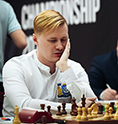Run, King, Run!
Dmitry Kryakvin’s report about the European Team Championship
Playing in the European Championship in Batumi, both Russian teams have taken gold in the following lineup: Dmitry Andreikin, Nikita Vitiugov, Maxim Matlakov, Kirill Alekseenko and Daniil Dubov in the men's team, and Aleksandra Goryachkina, Kateryna Lagno, Olga Girya, Valentina Gunina and Alina Kashlinskaya in the women’s team. This double success is not the first one in the history of chess. Still fresh and vivid in memory is Reykjavik-2015, old-timers will recall Heraklion-2007, and here also comes Batumi-2019. An amazing consistency from the five- and six-time champions of the Old World! The warmest words, of course, go to the coaches Sergei Rublevsky, Alexander Motylev, Alexander Riazantsev, Vladimir Potkin, and Evgeniy Najer!
The European team championship is a competition that you can talk and hear endlessly about without getting bored. Moreover, the tournament is sometimes looked upon as a junior brother to the Olympiad and the team world championship events. While certain teams choose to never come to this competition (there are 50 states in the Old World and a certain number of partially recognized countries, and there arrived as many as 40 to compete in Batumi), others show up in their “lite” lineups.
Nevertheless, if we take the open section, there have arrived many robust teams, such as the solid Englishmen (Adams, McShane, Howell, Jones, and only Short being replaced by Pert due to being overloaded with the FIDE assignments), the young Poles (Duda, Wojtaszek, Piorun, Tomczak, Dragun), and the Armenians (Aronian, Sargissian, Melkumyan, Martirosyan, Pashikian), who are making a gradual rotation of generations. Azerbaijan showed up without Radjabov, but they had no fears with Naiditsch playing for them (and besides Arkady, also performing for the team were Mamedyarov, Mamedov, Huseynov and Safarli). They were followed by the Spaniards captained by Shirov, and the Dutch team featuring Giri, backed up by the Van Forest family.
In the absence of Eljanov, Ponomariov and Korobov for men (and the Muzychuk sisters for women!), the Ukraine was numbered as low as the eighth in the starting list. However, a fresh draft got a chance to show their best. Thus, Volodya Onischuk was shining as board four for the Ukrainians.
This said, Russia also had a completely new lineup, while at the last moment Vladislav Artemiev asked to replace him because of the unstable form.
However, the European team championship was by no means an easy walk in the park for Alexander Motylev’s trainees. In addition to connoisseurs of the local cuisine, a fairly large number of very decent combative squads set foot on the Georgian soil. This is not to mention some very promising young players!
A big sensation happened as soon as round one as the Russia - Denmark match ended in a draw. It all started with Daniil Dubov quickly checkmating a talented Danish junior, a fresh GM.
Bjerre (Denmark) – Dubov (Russia)
Round 1
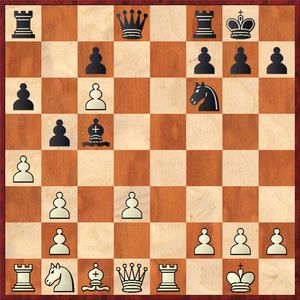
A spectacular new idea in Ruy Lopez along the lines of the Marshall gambit has advanced the native of Moscow's pieces to the shooting positions.
14...Bxf2+! 15.Kxf2 Qd4+ 16.Be3?
It loses mathematically, but revealing a sequence of proper moves is not easy even when using a computer. Thus, if we try to find shelter at h2 with 16.Kg3 Rae8 17.Rxe8 Rxe8 18.h3, it turns out that 18...b4!! leads to all White’s pieces boxed in at the queenside. Making up your mind in favor of 16.Kf1 Ng4 17.Re2 or 16.Kf3 is also far from easy.
16...Ng4+ 17.Kf3 Nxe3 18.Rxe3 Rae8 19.Re2
19.Rxe8 Rxe8 20.Qd2 Re6 21.g3 Qd5+ 22.Kf2 Qh1 is looking spectacular, but there is no lack of finesse in the game continuation as well.
19...Qf6+ 20.Kg3
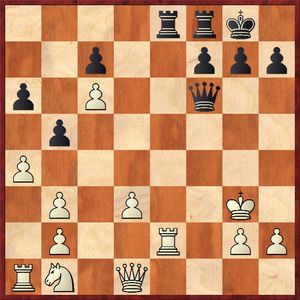
20...g5!
The pawn steps into the game nicely, rendering Bjerre's king position hopeless.
21.Rf2 Qd6+ 22.Kh3 Qh6+ 23.Kg4 Qh4+ White resigns.
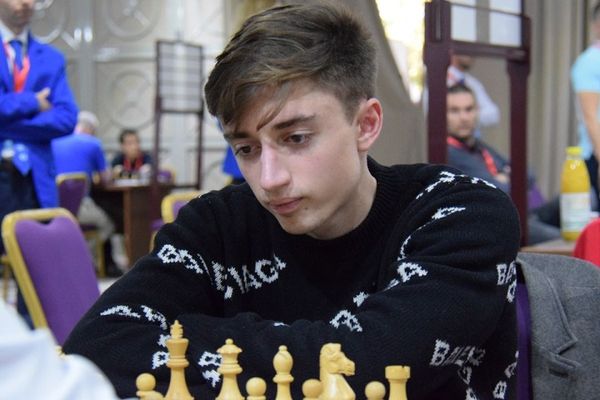
Here, apparently, the rest of the Russians were already feeling confident in the outcome and decided to go for more. As a result, Alekseenko fell victim to Hansen's checkmating attack, and Matlakov sacrificed the exchange and spent the rest of the game down material. It was only Andreikin, usually not prone to displaying much in the way of emotions, who brought the game to victory with an iron fist.
Round two pitted the Russians against the Austrians - not a stellar team, but with Ragger on board one. It was a rather plain sailing this time around as Vitiugov scored confidently as White and Alekseenko bounced back from his round one failure.
Blohberger (Austria) – Alekseenko (Russia)
Round 2
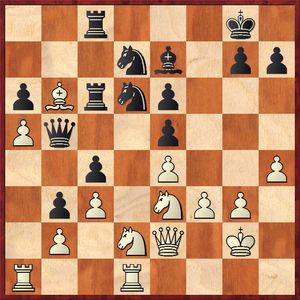
The b6-bishop is trapped, and the Austrian player seems in dire straights already. However, the sneaky engine shows 30.Ra3! Nxb6 31.axb6 Nb7 32.Raa1 Bc5 (32...a5 is no longer a good idea in view of 33.Ndxc4 Rxc4 34.Nxc4 Rxc4 35.Rd7 Qxd7 36.Qxc4) 33.Nb1! with complete equality. Blohberger did come up with the idea immediately, but a move later, which is fatal in chess more often than not.
30.Kf1? Nxb6 31.axb6 a5 32.Ra3 Nb7! 33.Rxb3?
33.Raa1 is no longer working in view of 33...a4! 34.Nb1 Rxb6 35.Na3 Bxa3 36.Rxa3 Nd6 as the а4-pawn stops White from getting counterplay along the a-file. Now the game enters the technical conversion phase.
33...Qa4!
The rook is trapped, and Kirill triumphed soon after.
There were times when the Hungarian team was giving no end of troubles to the Soviet chess establishment; the Leko and Polgar team drew a lot of Russian blood in the modern times as well, and now even the brave Rapport would not join the colors of the national team. Gledura, Erdos, Berkes and Prohaszka put up stubborn resistance, but Dmitry Andreikin ended up scoring nonetheless.
Andreikin (Russia) – Gledura (Hungary)
Round 3
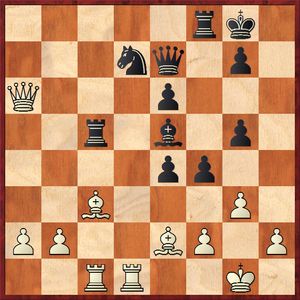
Black's tactical point looks extremely spectacular as 27.Bb4 is met by 27…fxg3 28.hxg3 Qf6 29.Bxc5 Nxc5 30.Rxc5 Qxf2+ 31.Kh1 Kh7!!, with dangerous threats to the white king. However, Andreikin’s intermezzo neutralizes the opponent’s counterplay.
27.Bg4! Kh8 28.Bb4 fxg3 29.hxg3 Qf6 30.Qf1!
The queen is in time to defend the king, but this is not the end of her glorious deeds.
30…Rxc1 31.Rxc1 Rb8
After 31...Re8 32.Qh3+ Qh6 33.b3 the matter is sealed by the white bishops and remote passers.
32.Be7! Qh6
The bishop is not to be touched: 32...Qxe7 33.Qh3+ Kg8 34.Bxe6+ Kf8 35.Qh8#.
33.b3 e3?
More stubborn is 33...Re8, and the text allows another lesson in geometry to be given by White.
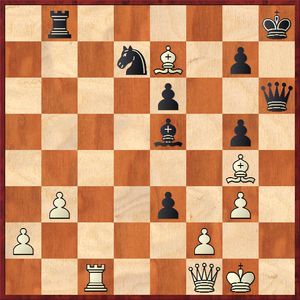
34.Kg2! Bb2
There is no saving the game any longer: 34...exf2 35.Qe2; 34...Kg8 35.Qc4 Kf7 36.Rh1 Qg6 37.Bh5.
35.Rb1 Ne5 36.Qe2 Qg6
There is no stopping the rook from getting to h1: 36...Nxg4 37.Rh1 Qxh1+ 38.Kxh1 exf2 39.Kg2. The Hungarian grandmaster throws the remaining forces into the battle, but they end up perishing in Andreikin's camp.
37.Rxb2 Nd3 38.Rc2 Re8 39.Bh5! Qe4+ 40.f3 Ne1+ 41.Kf1 Black resigns.
To create problems for yourself at the start and then heroically correct them is quite in the spirit of a Russian soul. By that time the ship flying the tricolor flag gained momentum, and round four saw the landslide defeat of the Turkish squad with a 3.5:0.5 score!
Vitiugov (Russia) – Can (Turkey)
Round 4
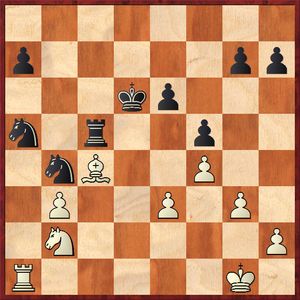
It might seem that Black successfully solved his defensive issues, but Can decided to go for a vulnerable pawn, much to his grief.
31...Nc2 32.Ra2 Nxe3? (32...Nb4) 33.Nd3!
Now Black loses either the exchange or the minor.
33…Nexc4 34.bxc4 Nc6 35.Nxc5 Kxc5 36.Ra6!
This is an important move. Now Black is unable to profit from his remote passer, and the white king arrives to the theater of action just in time.
36…Kd6 37.Kf2 Kc5 38.Ke3 Kd6 39.Kd3 Kc5 40.Kc3 Kd6 41.Ra1 h6 42.Rd1+ Ke7 43.c5 Black resigns.
Round five had a serious test in store for the Russians in the face of a traditionally formidable team of Armenia. Even if not being that memorable golden Olympic dream-team with Akopian and Movsesian in the lineup, sitting opposite us were a mighty Aronian, and Sargissian, a many-time winner of decisive games against Russia.
Willing to build up on his previous success, Sargissian was close to it, but facing him this time around was an adamant Vitiugov, and the game ended in a draw. Alas, somewhat low on firepower after the marathon at the Isle of Man, a native of St. Petersburg Alekseenko let Melkumyan go in a position in which Kirill is otherwise known to “flutter like a butterfly, and sting like a bee." However, coming to rescue was Dubov, an incredible Russian Hulk of the tournament in Batumi, who managed to crush the bastions erected by Pashikyan.
Pashikian (Armenia) – Dubov (Russia)
Round 5
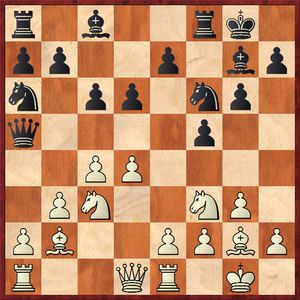
This is a typical setup for the Leningrad Dutch, in which the standard 11...e5 is habitually answered by 12.Qd2, intending to meet 12…e4? with 13.Nxe4. This is when Dubov comes up with a different idea.
11...f4! 12.Qd2
It was probably worth accepting the Greek gift – 12.gxf4 Qh5. 13.e3 Bg4 14.Qe2 Nc7 is not attractive at all because of the pin and speedy arrival of the black pieces to the theater of action. Instead, something like 13.Qd2 Bh6 (13...Bh3 14.Bxh3 Qxh3 15.Ng5) 14.e3 Bg4 15.Ng5 could have been attempted. However, it all sounds good when advised from your cozy office; the first player had to figure it all out for himself over the board.
12...fxg3 13.hxg3 Ng4!
The queen lift to h5 is in the air again.
14.d5 cxd5 15.Qxd5+? (15.cxd5) 15...Qxd5 16.cxd5 Bd7 17.Rab1 Rac8
White will be up against significant issues if choosing to transpose into an endgame.
18.Ne4 Nb4! 19.Bxg7 Kxg7 20.Nd4 (20.Neg5!?)
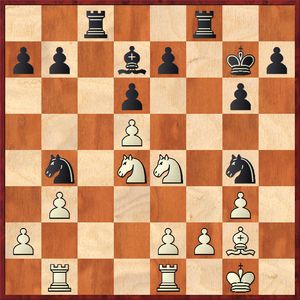
20...Nc2 21.Red1 Nxd4 22.Rxd4 Rc2
With the rook infiltrating the refreshment stall, material gains are about to take place before long.
23.Ng5?
More stubborn is 23.Bh3 Rxe2 24.Nc3 Rc2 25.Bxg4 Bxg4 26.Rxg4 Rxc3 27.Re1, emerging in a rook ending only down a pawn. The text gives Dubov a lot more superior version with active pieces and more material to his good.
23...Nxf2 24.Bf3 h6! 25.Kxf2 hxg5 26.Re4 g4! 27.Rxe7+ Kh6 28.Rxd7 Rxf3+ 29.Kg1 Rxg3+ 30.Kf1 Rh3, and Black went on to win the game.
After the midline, the lead was co-shared by the Russian and Ukrainian athletes, and their head-to-head encounter in round six was likely to decide the future champion's title. The match opening was incredibly combative, and the contest promised an unprecedented intrigue to come. Nevertheless, it is not uncommon for many draws to resolve tension like this, and only one game remained in which Andreikin was giving a hard time to the opponent's leader.
Andreikin (Russia) – Ivanchuk (Ukraine)
Round 6
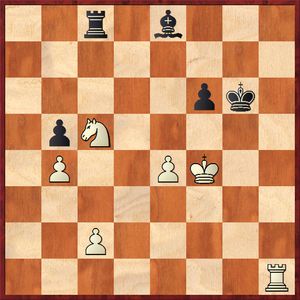
White's task is complicated by very little material remaining on the board. More stubborn than the text is 48...Bc6 or 48...Rc7, intending 49.e5?! fxe5+ 50.Kxe5 Re7+, whereas
48...Ra8
enabled the GM from Ryazan to demonstrate his filigree-like technique.
49.e5! fxe5+
Black has to contribute to the white king's activation as 49...Ra2 50.e6 Rxc2 51.Rg1+ Kh6 52.Ne4 is way too underwhelming for him.
50.Kxe5 Ra3 (or 50...Ra2 51.Rh2) 51.Ne4 Bc6 52.Rg1+ Kf7 53.Nd6+ Ke7
The black king is cut off from his army – 53...Kf8 54.Nf5 Rc3 55.Nd4 Bd7 56.Kd6, and White is gradually zeroing in on the so coveted b5-pawn.
54.Rg7+ Kd8 55.Kd4 Bd7 56.Rg5 Ra2, and Ivanchuk resigned without seeing his b5-pawn fall after 57.c3 Rd2+ 58.Kc5, upon which White gets the connected passed pawns.
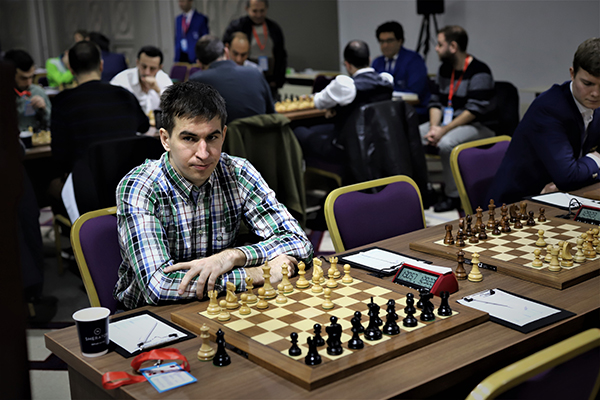
This major success propelled the Russians to an unshared lead with 11 match points under their belts, but trailing not far behind was team Germany (10 point), and, apart from the Ukrainians, both Armenia and England scored 9 points apiece. The matchup against team Germany proved a very challenging one as Nisipeanu broke through Vitiugov’s central defenses, but coming to team's rescue with yet another “unfading” or “evergreen” masterpiece was Daniil Dubov.
.
Dubov (Russia) – Svane (Germany)
Round 7
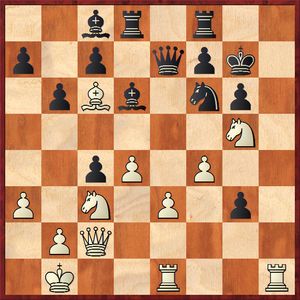
Dubov’s display in the queen's gambit came very much to the satisfaction of those who feel down at the sight of this opening as White, but the Russian's inaccuracy proved enough for Rasmus to come back into the game again. Another wave of attack was needed for White for that reason.
20.Nd5! Nxd5 21.Rh7+ Kg8 22.Rxf7! Rxf7
ChessPro gives a more precise 22...Nc3+! 23.bxc3 (after 23.Qxc3? Rxf7 24.Bd5 Rdf8 25.Qxc4 Kg7 White's going down is not out of the question), and now 23...Rxf7 24.Qxg6+ Kf8 25.Qh6+ Rg7 26.Bd5 leads to a position bearing similarity to the actual game, whereas 23...Bf5! 24.Rxf5 Rxf5 25.Bd5+ Kg7 (bad is 25...Rxd5? 26.Qxg6+ Qg7 27.Qe6+) 26.Ne6+ Kh6 27.Rh1+ Rh5 28.Rxh5+ gxh5 29.Nxd8 Qxd8 30.Qf5 Be7 31.Bf7 Qd6 allows Black to escape in one piece because of the surviving g3-pawn.
23.Qxg6+ Kf8
Bad is 23...Rg7? 24.Bxd5+.
24.Qh6+ Rg7 25.Bxd5 Ke8
Black needed to give a check 25...Bf5+ 26.e4 Ke8 27.Bc6+ Bd7 28.Qh5+ Kf8, and White has to put up with a draw after 29.Qh6 Bxc6 30.Qh8+ Rg8 31.Qh6+= ChessPro.
26.Qh5+ Kd7 27.Qh3+ Ke8 28.Qh5+ Kd7
The young German was most likely in the belief that White could not decline the repetition, but this is a well-known misjudgment. As you know, Bardeleben also thought that Steinitz was obliged to give a perpetual check.
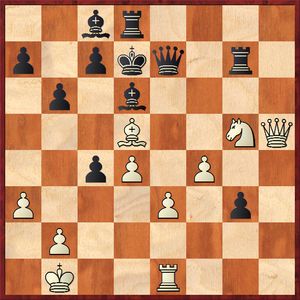
29.Be6+ Kc6?
Black needed to give up his king for a bunch of pieces: 29...Qxe6 30.Nxe6 Kxe6; however, 31.f5+ Ke7 32.e4 is more pleasant a position to play as White. Now Dubov delivers a checkmate and goes down into the glorious history of chess.
30.Qf3+ Kb5 31.Bxc4+! Ka5
31...Kxc4 32.Qc6+ Bc5 33.Rc1+ Kd3 34.Rc3+ Kd2 35.Qg2+ Kd1 36.Rc1# is not hard to calculate, but is there hunting down the runaway king at the rim of the board?
32.Qd5+ Bc5
32...c5 33.b4+ Ka4 34.Ka2.
33.b4+ Ka4
His Majesty seems to have found safe heavens behind the opponent's pawns, but Dubov forces the opponent to pick them up in a study-like way, after which execution is inevitable.
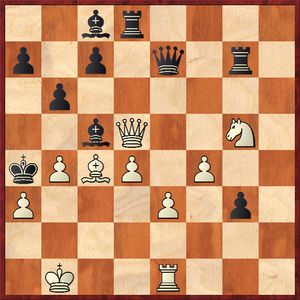
34.Qg2! Bxb4 (34...Bf5+ 35.Ka2 with a checkmate) 35.Qc6+! Kxa3 36.Bb3!!
A final finesse. 36...Bf5+ 37.e4 changes nothing, and it is a pleasure that Rasmus did not stop his opponent from delivering a checkmate.
36…Bd737.Qc1+ Kxb3 38.Qc2+ Ka3 39.Qa2# An incredibly spectacular display!
The tournament situation turned really tense as a result! Teams Ukraine, Germany and England were lagging behind the Russians by one point, and the former sported a gorgeous Sonnenborn-Berger tiebreaker.
The Russia-England match opened on a very positive note for Alexander Motylev’s team as Matlakov was pressing Jones right from the opening, sending his opponent into a terrible time pressure; however, Matlakov hesitated only a step away from the victory. It was Vitiugov’s turn to come to the team's rescue.
Vitiugov (Russia) – McShane (England)
Round 8
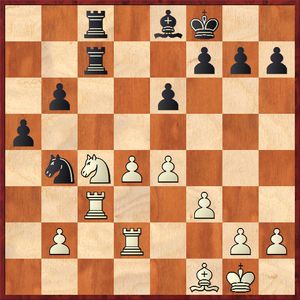
How about advancing the central pawn in the endgame? Vitiugov seems to have upgraded this passer into a kind of Nevsky Express train that proceeded non-stop to the queening square.
28.d5! (one) 28…exd5 29.exd5 Rb8
29...Rd8? fails to 30.Nxb6, and 29...Rb7? 30.Nd6 Rxc3 31.bxc3 Rd7 32.Nxe8 Rxd5 33.Re2 is also bad for Black.
30.d6 (two) 30…Rcb7 31.Ne5 Rd8
Or 31...f6 32.d7 fxe5 33.d8Q, dropping the exchange.
32.d7 (three). Black does away with the proud passer at too high a cost.
32…Bxd7 33.Bb5 Bxb5 34.Rxd8+ Ke7 35.Rd1 f6 36.Re3! g5
Or 36...fxe5 37.Rxe5+ Kf6 38.Rxb5 with an easy victory.
37.Nc4+ Kf8 38.Rd8+ Kg7 39.Nd6 Black resigns.
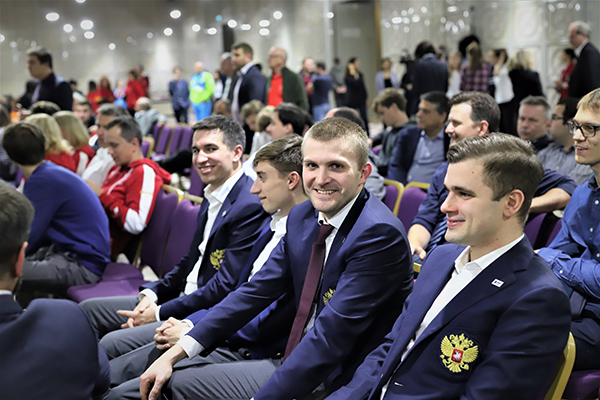
Alas, the most seasoned Michael Adams made me recall his old nickname Spiderman as it was a web that he had wound around Andreikin's position in the end. The final score 2:2 favored team Ukraine that defeated team Germany with a 3:1 score.
As mentioned above, boasting better additional tiebreakers, Alexander Sulypa's team would have been fine with any victory over the Croatians. However, it was not as easy as that. The Croatians are now resurrecting the rich chess traditions of Yugoslavia, and a strong team championship sporting a large number of legionnaires takes place in the country.
The Ukrainian chess players are amazing fighters. There are no tournaments in the country, the older generation of coaches is gone, and talented youth are moving to study in the USA. This said, the team shines no matter what! The history knows none capable of stopping the Ukrainian team bursting for action to take gold! Team Russia also went down to team Ukraine back in 2001. Only in 2016, despite the major defeat of the Slovenes, the Ukraine still lagged a bit behind the Americans in terms of additional tiebreakers, finishing second.
Therefore, there persisted certain pessimism regarding the chances of the Croatians in the final matchup, but Saric, Bosiocic, Stevic and Brkic managed to stop the Ukrainians dead in their tracks on the way to the gold medals. Nevertheless, in the end Ivanchuk’s being no longer that young and full of energy took its toll as the marathon finish saw the Lviv magician miss Saric’s idea of building up a fortress.
Meanwhile, in Russia vs. Poland it was Alekseenko who made his voice heard. It proved the golden game of the entire Batumi event!
Alekseenko (Russia) – Piorun (Poland)
Round 9
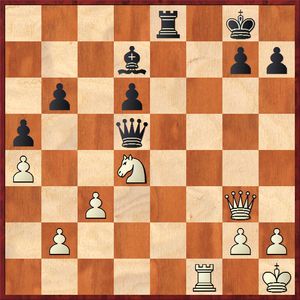
It is yet another example of suffering from pawn gluttony. Black had nothing to worry about after 29...Rf8!; however,
29...Bxa4!?
allowed Alekseenko to launch a dangerous offensive:
30.Nf5 g6 31.Nh6+! Kg7 32.Qh4 Re4?
Saving the game was a study-like 32...Qe6! 33.Nf7 (33.Rf7+ Kh8) 33...Rf8 34.Qd4+ (34.Qh6+ Kg8 35.Qxf8+ Kxf8 36.Ng5+ Qf5 37.Rxf5+ gxf5 38.Nxh7+ Kg7 39.Ng5 Kf6) 34...Qe5! an excellent and complex example on the topic of defense.
33.Ng4 h5 34.Qf6+ Kh7
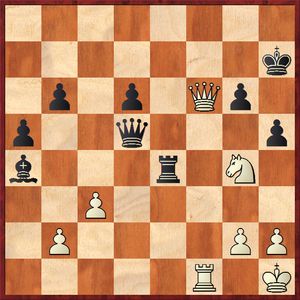
35.Qf8!
Black will have to give up the queen to escape the checkmate, and the conversion of extra material is not difficult since Piorun’s forces are discoordinated.
35…hxg4 36.Rf7+ Qxf7 37.Qxf7+ Kh6 38.Kg1 Kh5 39.Kf2 Bc2 40.Qd5+ Re5 41.Qxd6, and a lone queen was powerful enough to do away with the opponent’s forces.
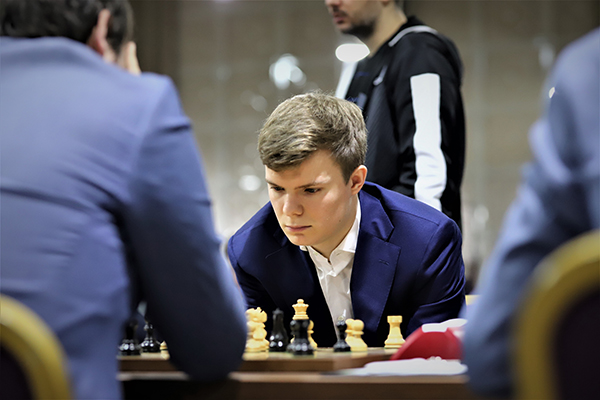
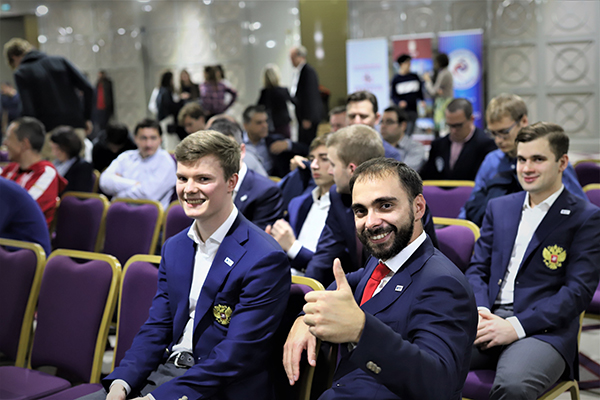
In the women's section, the Russian team looked like a clear favorite. Thus, the average rating of the Ukrainians (Ushenina, Gaponenko, Buksa, Osmak, Zhukova) in the absence of the Muzychuk sisters was as many as 110 points lower! However, in women's chess the tournaments are not won with just the numbers, and the lineup of the tournament’s number two of Georgia was very impressive indeed: Dzagnidze, Javakhishvili, Khotenashvili, Arabidze, Melia.
In the first few rounds, confident victories were scored by Russia over Israel, Georgia-2 and Spain.
Matnadze (Spain) – Girya (Russia)
Round 3
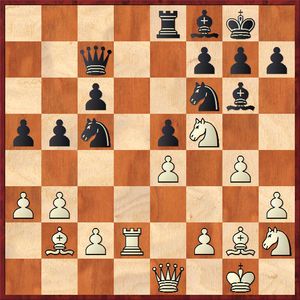
27.h4? h5! 28.g5 Nfxe4! 29.Bxe4 Nxe4 30.Qxe4 Qc8, and Black's victory was plain sailing.
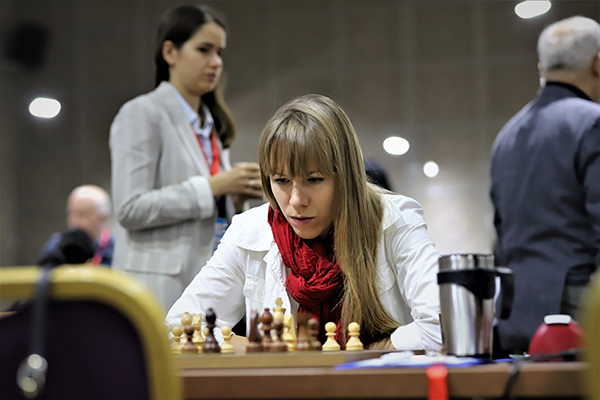
In round four, Rublevsky's golden girls were to face their principled opponents from team Georgia. The score could have been much higher as Lagno had great winning chances, and Girya was enjoying the edge as well, but in the end it was the joker and favorite of Russian chess fans who dealt a victorious blow.
Gunina (Russia) – Arabidze (Georgia)
Round 4
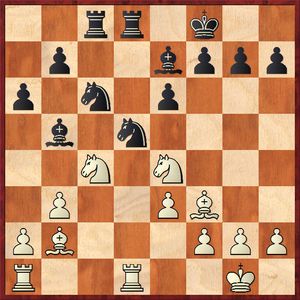
18.Ncd6! Rb8
There is no mistake in the calculations: 18...Bxd6 19.Nxd6 Rxd6 20.Ba3! or 18...Rxd6 19.Nxd6 Bxd6 20.a4, winning.
19.a4 f5 20.Nc5 Rxd6 21.axb5 axb5 22.Nxe6+! Rxe6 23.Rxd5 Bf6 24.Bxf6 Rxf6 25.Rxb5, and White went on to convert her up a pawn superiority.
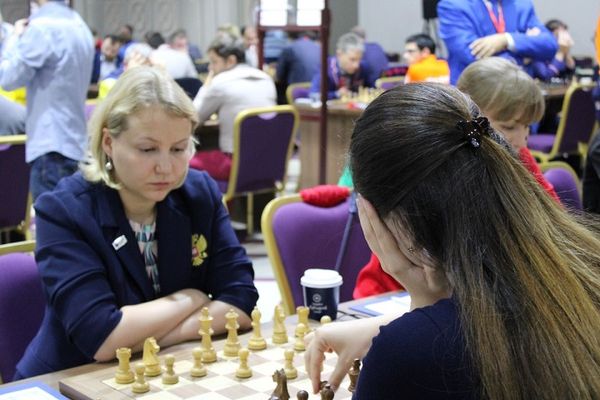
In the sixth round, the Russian athletes were pitted against an unyielding Hungary, but force majeure happened at the very beginning when Anita Gara would not show up for the game with Olga Girya! Having received a “plus” and with two white colors at the remaining three boards, the Russians scored a confident 3:1 victory.
Over a long period of time the Russian women's team was having its own “uncomfortable” opponent in the face of team Poland. However, unbeatable in recent years in Europe, Rublevsky's armada seems to have cracked the secret of her opponents. This time the outcome of the battle was utterly disastrous for Poland - 0:4!
Goryachkina (Russia) – Socko (Poland)
Round 7

The runner-up scored +3 on board one and finished undefeated.
26.Re1 Nd3?
26...Ng6 27.Nd6 is grim-looking for Black, and Monica overlooks the decisive knight pirouette.
27.Nb6! Bd5
The rook is not to be touched because of the checkmate on g7.
28.Nxd7 Qxd7 29.Rexe4 Nxf2 30.Re2 Qc7 31.Rxf2 Rxf2 32.Qxf2 Black resigns.
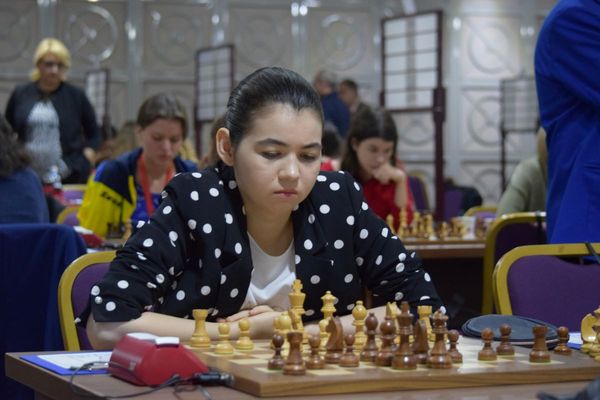
With 13 points after round seven, the Russian team was two points ahead of team Georgia and three points ahead of Azerbaijan, Armenia and Ukraine. However, it was too early to celebrate yet! Armenia was giving a hard time as Sargsyan defeated Gunina, and Danielian was pressing Girya’s position for a long time, but the latter made a draw with precise defense. Nevertheless, at the remaining boards the Russian players showed their mettle. Goryachkina attempted to outplay her opponent in a 4 vs. 4 queen ending over 80 moves (without success, though), and Lagno managed to outperform her opponent in a classical rook vs. rook and bishop ending.
Lagno (Russia) – Ghukasyan (Armenia)
Round 8
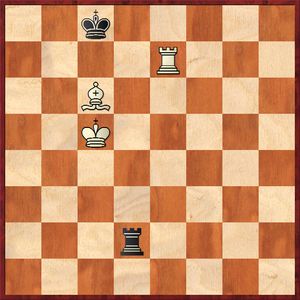
I will refrain from giving move evaluation marks in the hope that you look up the Dvoretsky book for a drawing mechanism!
105...Rd1 106.Bd5 Kd8 107.Rg7 Kc8 108.Kd6 Kb8 109.Rb7+ Kc8 110.Ra7 Rb1 111.Rg7 Rb6+
Alas, 111...Kb8 112.Rg8+ Ka7 113.Ra8+ Kb6 114.Rb8+ is no longer a way out.
112.Bc6 Black resigns.
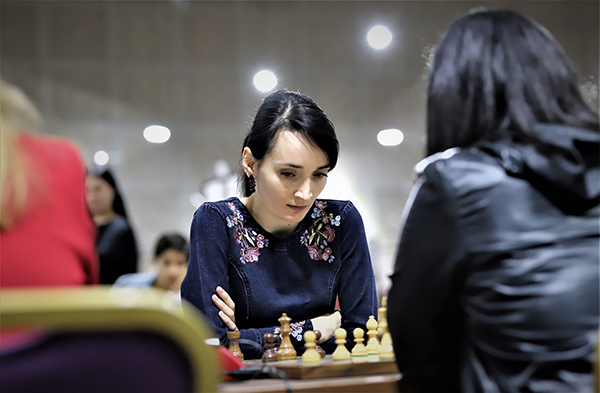
The match was drawn, and now the first place required the Russians nothing less than winning the match against a fairly good Turkish team (Atalik, Yildiz, Ozturk). This goal was achieved with a big score of 3.5: 0.5!
Caglar (Turkey) – Kashlinskaya (Russia)
Round 9
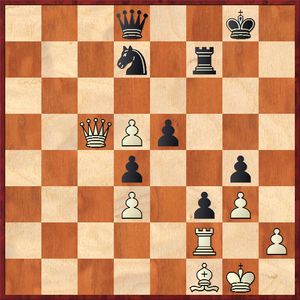
Andreikin’s lessons will enable us to easily find 44.Qc1, intending 44…Nf6 45.Qg5+, but Caglar did not find it.
44.Qb5? Nf6 45.Ra2 Qxd5
The root pawn is down, and the rest is easy.
46.Qb8+ (trading the queens off loses as well: 46.Qxd5 Nxd5) 46...Kg7 47.Rb2 Qc5 48.Qb5 Qc1 49.Rf2 Qe3 White resigns.
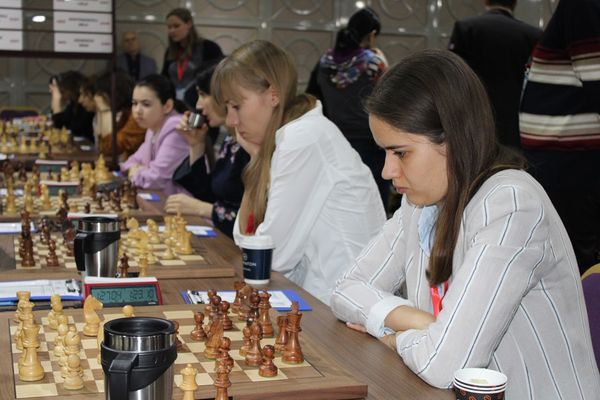
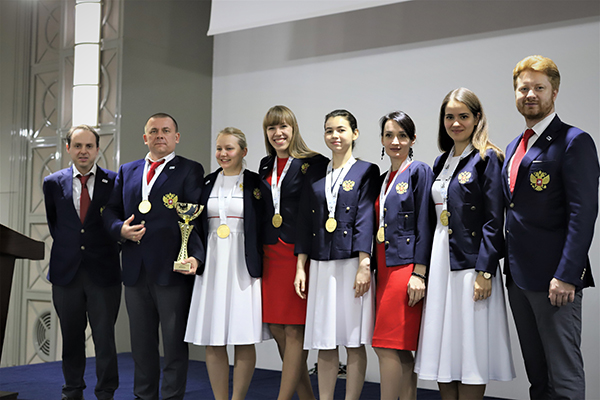
The last team tournaments are now over, save, perhaps, for the Russia - China match scheduled for November. We are looking forward to the chess Olympiad now. Vladimir Kramnik, who had already abandoned the tournament praxis, admitted frankly that his last dream in the black and white kingdom was taking the Olympic "gold", unattainable to the Russian men's team ever since the epic Bled-2002. The Russian women's team suffered failures at the two latest Olympiads. There is no place like home, they say! Let us wait and believe in success.
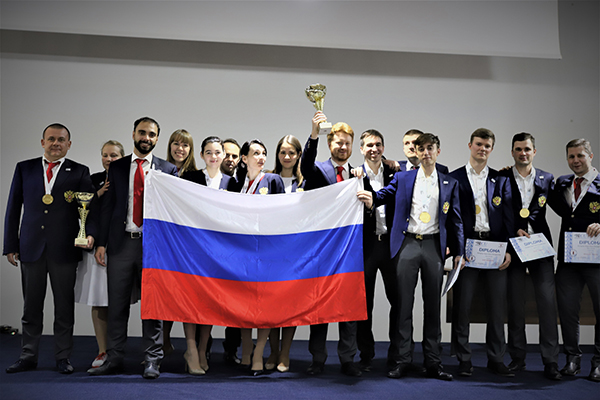
Pictures: Dr. Mark Livshits and the official website






















